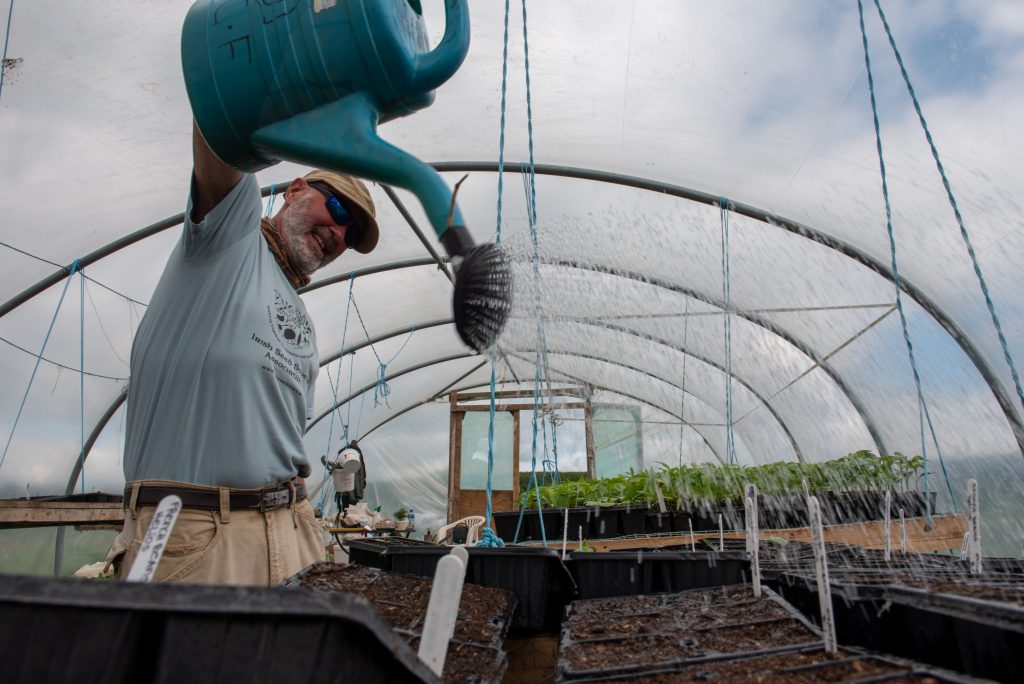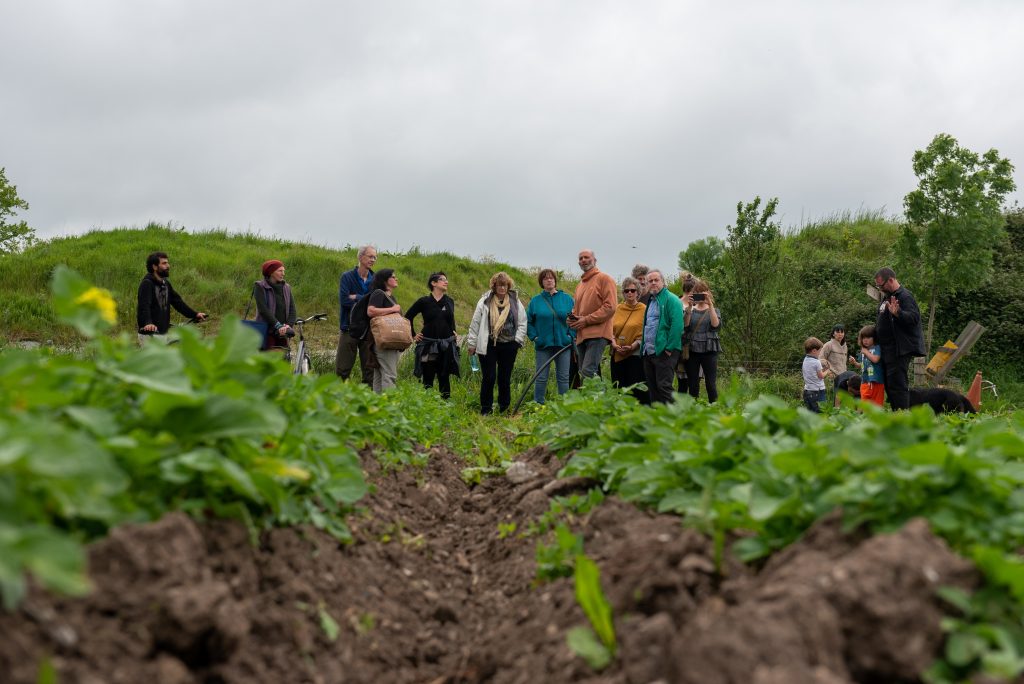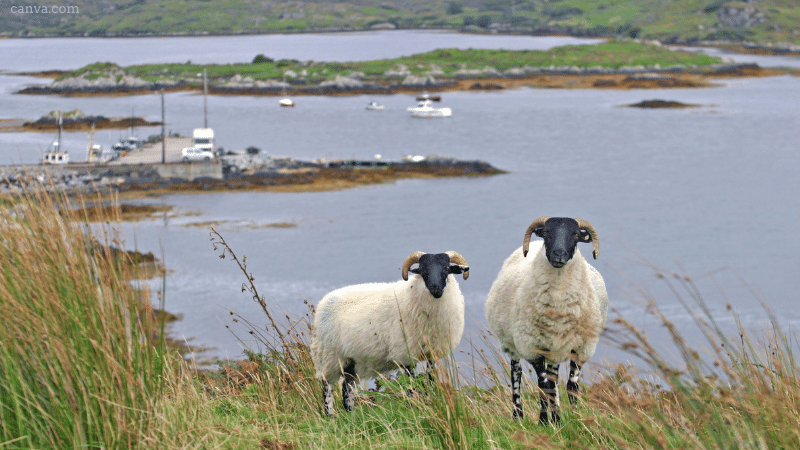Ireland’s flagship agri-food export marketing initiative Origin Green should be discontinued, while Ireland’s state agricultural research organisation Teagasc should have its legal mandate reviewed. And an independent body, potentially the Environmental Protection Agency (EPA) should “establish and implement a robust monitoring framework to assess the full environmental impacts of food production at farm, catchment and national level.” That’s according to the three umbrella environmental coalitions and networks in Ireland, who today launch a new policy document.
Towards a New Agricultural and Food Policy for Ireland: Recommendations for Government is jointly published by The Environmental Pillar, Stop Climate Chaos, and Sustainable Water Network (SWAN), who together represent over 70 distinct organisations.
“Discontinue Bord Bia’s Origin Green Programme because of the conflict of interest between the marketing aims of the programme and the role of Bord Bia in producing their own sustainability assessments and metrics.”
“Review the legal mandate of Teagasc (Ireland’s Agriculture and Food Development Authority) with a view to reorienting its research and advisory activities towards a sustainable agroecological model, ensuring that environmental expertise is immediately represented on its board and management.”
The environmental organisations* are joined by two farming organisations – Talamh Beo and the Leitrim Organic Farmers Co-op – in criticising the direction farming and food have taken in Ireland.
(*Stop Climate Chaos also include civil society organisations, in particular development organisations focused on the global south)
“Ireland has careened down a path of specialisation and intensification and has left farmers locked into an unsustainable commodity-driven food production system, leaving them exposed to an array of vulnerabilities. This current model also goes against Ireland’s own legal obligations and undermines its international reputation on food security. The next decade is critical for our climate and biodiversity targets. We can and must reset our trajectory while improving rural livelihoods.”
That’s according to John Brennan Manager of Leitrim Organic Farmers Coop and member of Talamh Beo, at the launch of a new policy document for Irish farming and food.
Talamh Beo is affiliated with ECVC (European Coordination Via Campesina) and has come out in support of “Towards a New Agricultural and Food Policy for Ireland”.
Read and Download Towards a New Agricultural and Food Policy for Ireland
What’s in the document?
The new policy document has ten chapters with an emphasis on severe failings – but also policy recommendations – in a number of key areas. These include the core areas the three umbrella coalitions are focused on – biodiversity, climate, air and water policy. However equal attention is paid to sustainable livelihoods, farm diversification, public health, sustainable consumption, food and nutrition security, overarching considerations and, importantly, the next steps.
With Ireland’s poor performance in climate, biodiversity and air and water quality, concurrent with the rapid growth in the dairy sector post quota abolition, it is unsurprising that much focus is dedicated to avoiding excessive fertilizer use and curtailing the growth of the dairy herd.
Ten Chapters in “Towards a New Agricultural and Food Policy for Ireland”.
- Develop a Policy Framework Aligned with Ecological Limits and Environmental Commitments
- Protect and Restore Biodiversity on Farmland
- Protect and Restore Peatlands and Woodlands on Farms
- Ensure that Agriculture Delivers its Fair Contribution of the 51% Reductions in Greenhouse Gas Emissions by 2030 Committed to in the Programme for Government
- Urgently Improve Air Quality
- Halt and Reverse Water Quality Decline
- Support Sustainable Livelihoods and Incentivise Farm Diversification
- Contribute to Public Health and Sustainable Consumption
- Contribute Meaningfully to Food Security and Nutrition
- Facilitate Inclusive Dialogue and Participation for an Alternative Model for Agriculture in Ireland
According to Irish state agricultural research agency Teagasc, dairy cow numbers will continue to rise until at least 2027, and by almost 200,000 head. The document emphasises the negative impact this growth has on both beef and tillage sectors, and the related loss of potential to provide for high nature value farming and for lower carbon food production: while, in emissions terms, the per kg performance of dairy is often cited as more efficient than beef or tillage, this is both contested by the environmental organisations (footnote 146 in particular) and is also “a distraction” as absolute emissions are rising, in a way that is spearheaded by diary, the policy argues.
Noticeable too is the emphasis on what for Ireland would be genuine innovation, such as agroforestry, and on big impact climate and biodiversity measures which could be supported by CAP, such as rewetting peatland and wetlands. Much focus is given to the potential for high nature value farming and its support via CAP. Rewilding is mentioned a surprisingly large number of times – 12 – but it is noticeably qualified as an approach that “must be based on a scientifically robust rationale, and an assessment of the potential ecological and social costs and benefits”.
“Agriculture is responsible for 35% of Ireland’s annual greenhouse gas emissions and is the single largest sectoral contributor to Ireland’s overall climate impact.”
“Ireland is in breach of the National Emission Ceilings Directive (NECD) on ammonia, with agriculture dominating emissions of ammonia (99%) because of animal manures and nitrogen fertiliser”
The timing is very appropriate too, with the Environmental Pillar having rejected the government and industry led agri-food 2030 strategy process, which it had been involved with, as the only environmental stakeholder out of 30 participant groups or sectors.
Walk Out – Environmental Pillar Rejects Irish State’s Agri Plan
This is Ireland’s next five year plan for agriculture which is currently out for consultation – and the CAP trilogues currently concluding. The latter see land eligibility rules being discussed, which, in a context of a number of uncontrollable fires blazing in some of Ireland most pristine environments, could not be more opportune: strict definitions and interpretations of what constitute eligible land for CAP payments are being blamed, rightly or wrongly, for encouraging at least some farmers and turf cutters to burn off vegetation to access productive fields or fuel sources.
See below for a detailed thread on land eligibility ,fires and flooding in Ireland
Season-specific controlled burning is seen as good practice in some contexts, and there may be other causes of these fires – and indeed officially farmers caught doing out of season burning would loose payments. Nevertheless, this is, as it were, a hot topic in Ireland right now. Some of the last ancient woodlands – in a country with the lowest level of pristine forest in Europe due in part to a history of colonial extraction – go up in smoke.
What’s in the document for farmers and rural communities?

Talamh Beo note that a sea change is required in agri-food policy in general: ““We as farmers in Talamh Beo welcome Towards a New Agricultural and Food Policy for Ireland being launched today. We are ready to make the transition to a farming system which enhances biological processes, regenerates ecosystems and builds people’s Food Sovereignty. We believe this document offers a better future to Irish farmers than a continuation of the agribusiness model. Currently our whole agri-food system is industry designed and led and we need to make it farmer and community led – this document gets us moving in that direction”.
Specifically, Towards a New Agricultural and Food Policy for Ireland dedicates significant space to arguing for sustainable livelihoods and for incentivising farm diversification – “on-farm diversification (such as agroforestry, horticulture, mixed organic farming, agri- and eco-tourism, and social farming) can improve farmers’ livelihoods by opening up new economic opportunities.”
This is to be done within a just transition framework: “Just transition principles that seek to address the current inequities within the sector must also underpin this shift to an alternative agricultural model. This will help ensure that farm diversification alternatives and payments for ecosystem services adequately compensate farmers for any radical or abrupt changes that are required.”
This would see the strengthening of rural economies via local food initiatives like community supported agriculture, high nature value foods, more organic farming (organic farms have 10-20% more employment per hectare according to the OECD, as referenced in the EU Biodiversity Strategy pg 8) ; and better supports for both horticulture and tillage, though for the latter, the idea is to transition more towards human and away from animal supply.
“As a national policy priority, substitute imported horticulture food items with cereals, fruit and vegetables grown in Ireland”; Incentivise a shift in the tillage sector away from producing feed grains for the livestock sector, to producing outputs such as cereals and pulses directly for food consumption to reduce Ireland’s reliance on imported food. Strengthen supply chains and the domestic market opportunities for Irish tillage farmers by supporting the production of organic certified cereals and pulses that offer price premiums for the tillage sector.”
Other areas of synergies with farming interests includes improving the traction of both high nature value farming and of results based schemes. 33% of the agricultural area in Ireland has High Nature Value (HNV) characteristics, the paper states, quoting research by James Moran and others, while adding that these farms must remain viable.
“The State should reward farmers for the public goods HNV farmland provides and ensure the socio-economic viability of rural communities. Scaling up locally adapted and financially attractive results-based agri-environment payment schemes will be important for restoring biodiversity on all farm types…”Reward farmers for the public goods HNV farmland provides and improve its viability by promoting recognition and demand for these goods and services.”
“Scale up locally adapted results-based agri-environment payment schemes on all farm types. Scheme payments must be financially attractive and supported by improved monitoring and evaluation systems for biodiversity actions and outcomes. Schemes should support biodiversity, carbon sequestration and water quality including active rewetting and maintenance of bogs, riparian planting, agroforestry, continuous cover forestry and hedgerow conservation.”
Such an approach may work well with the new Results Based Environment-Agri Pilot Project (REAP) proposal in the Department of Agriculture’s own policy proposals, whereby a results-based trial will bring in 2000 farmers and will build on the EIP framework.
This is also an inclusive document for farmers and rural dwellers. A full final chapter is dedicated to how this initial policy paper, will engage the wider farming and rural communities in building something significant and robust to help with a genuinely just transition.
The chapter snappily entitled “facilitate inclusive dialogue and participation to envision an alternative model for agriculture in Ireland” points to the next steps, to try to being Irish agri-food policy and practice more into line with planetary boundaries and rural needs:
“A transition to a sustainable agricultural system will not be possible without ongoing multi-stakeholder dialogue. Drawing on the recommendations presented in this report, the Environmental Pillar, Stop Climate Chaos Coalition, and SWAN are committed to engaging in dialogue and discussion, with all relevant stakeholder groups, where there is genuine commitment to deliver an alternative, fairer model for Irish agriculture (pg. 47)”
It is also noteworthy that CAP is referenced as a policy which “exacerbates income inequality”; land eligibility criteria can see farmers “penalised for keeping certain biodiverse landscape features on their land” and so on.
What’s Next?

The clue is in the title: by starting with the word “Towards” we see a call for others to come in and work with the environmental sector to built out a just transition for agri-food and rural Ireland.
“We believe that a successful transition to a sustainable food system requires an ongoing dialogue and cooperation between farmers, civil society, and experts across climate, water and biodiversity, and policy-makers an approach that has been lacking to date in the formulation of Irish agri-policy. The policy making process should reflect the diversity of perspectives now needed from a range of stakeholder voices, including farmers from all sectors, agri-extension workers, rural sociologists, political economics (sic), environmental, animal welfare, and public health experts, and consumers to address the complex socio-environmental challenges faced by the sector, and broader public health, food security and sustainable food system challenges. We need a dialogue that is based on creative engagement, including awareness raising and participation in decision-making, via citizens assemblies and/or dialogue fora and regional exchanges, as reflected in the final action of AgClimatise.”
This process will help deliver “a detailed, target-driven roadmap that shifts Irish agriculture away from the commodity-driven, export-focused production of meat and dairy produce, and brings it in line with these EU strategies and with national obligations on climate, water and biodiversity.”
This is important because the document, while good at outlining the problems, limits and recommendations, is not comprehensive – that rewilding gets more focus than either horticulture or organic farming will not win hearts and minds of food producers thinking about diversification. It is also short on CAP details and integration, which it acknowledges, pointing to upcoming work to be done. It is also not a comprehensive just transition plan for the sector, with for eg scenarios outlining how farm numbers and viability, the economy, and rural Ireland would be impacted by various implementations of just transition. All if this, taken positively, means engagement with wider stakeholders is needed, which will be fruitful for adding to this document.
With impeccable timing, coinciding with the Department of Agriculture’s own consultation for its industry-led but environmental-tepid five year plan, the gauntlet has been thrown down. In particular, Bord Bia, Teagasc and the EPA have been named and targeted. Indeed, the role of the EPA in this government agri-food strategy development, when it have been so critical of Irish agri-food policy to date, must surely now be under pressure: will the EPA stand over yet another agri-food plan that will not align Ireland with the Paris accord, or the most basic of pollution targets and environmental law? Will the EPA stay in the government-led process, and, moreover sign off on a final document with targets as weak as a 10% reduction in methane emissions by 2030, as is currently in the draft version? This target is basically the same target as was in the Teagasc plans from 2019, as if EU and Irish government targets have not changed since then. For all its solid research and verbal posturing, where will that leave its credibility?
More on Ireland
Farming as its Ferment to be? Korean Natural Farming in Ireland




